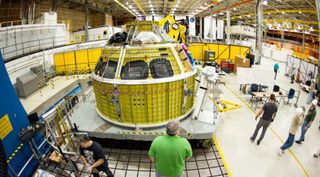Lockheed Says Orion Still on Schedule for 2018 Mission

WASHINGTON — As Lockheed Martin completes one key element of the next Orion spacecraft, a company executive says he is confident the spacecraft will remain on schedule for launch in the fall of 2018.
In a ceremony Jan. 26 at the Michoud Assembly Facility in New Orleans, NASA and Orion prime contractor Lockheed Martin marked the completion of the pressure vessel for the Orion spacecraft that will fly on the first launch of the Space Launch System in 2018. The pressure vessel, the underlying structure of the Orion crew module, was assembled at the facility.
The pressure vessel will be shipped this week to the Kennedy Space Center, where workers will spend the next year outfitting the crew module with its various subsystems, including propulsion, avionics and life support. "We will be doing a power-up of the full crew module about a year from now," said Mike Hawes, Lockheed Martin's Orion program manager, in an interview. [NASA's Orion Space Capsule in Pictures]

Hawes touted improvements in the manufacturing process over the first Orion spacecraft, including reducing the number of body panels and welds required for the structure. That has reduced the structure's mass by a few hundred kilograms. "That has been a huge advantage for this particular crew module, and it's the basis for going forward" on future Orion spacecraft, he said.
Lockheed Martin is also keeping tabs on the development of Orion's service module, which is being provided by the European Space Agency. Company personnel are monitoring tests of a service module structural test article at NASA's Plum Brook Station in Ohio. "My team has people up there all the time now," he said.
While work continues on Orion's crew and service modules, the capsule that flew on Orion's first test fight in December 2014 will undergo acoustic testing at a Lockheed Martin facility near Denver to model the SLS launch environment. Hawes said those tests will begin shortly, after completing work to decontaminate the spacecraft after its brief flight by removing residual ammonia coolant and hydrazine propellant.
All that work, Hawes said, is on schedule for a flight in late 2018. "I think, based on what I know of how we're doing on our production, we're going to be in shape to make the fall of '18," he said. "I think we're making the progress that we need to in order to be ready."
Get the Space.com Newsletter
Breaking space news, the latest updates on rocket launches, skywatching events and more!
Hawes acknowledged, though, that staying on schedule will be a challenge. "We're running hard. It's still an aggressive schedule," he said. "There is a lot of work to happen from this point on, and a lot of work that all of our suppliers will be doing over the next two years to get ready for flight."
That assessment comes after the annual report by an independent NASA safety group, the Aerospace Safety Advisory Panel (ASAP), raised several questions about the schedule for Orion. Those concerns included the decision last year to change Orion's heat shield from a monolithic layer of Avcoat to a "molded block" surface of the same material.
"While NASA has had extensive experience using a block tile heat shield on the Space Shuttle, not all of that experience has been positive," the panel noted in its report, published Jan. 13. "In our opinion, the test of the new Orion heat shield has become one of the most important mission objectives" for the 2018 flight.
Hawes said the program is developing the Avcoat blocks and testing techniques for the heat shield, and noted NASA has independent testing of the heat shield underway as well. "There's an awful lot of work that's going on that I don't think has an opportunity to get captured in kind of summary report, in terms the work that we've been doing to mitigate those concerns," he said.
The panel also raised concerns about "zero fault tolerant" failure modes in Orion's service module. In such situations, the report stated, the single failure of a component such as a propellant valve could result in a "catastrophic failure" of the overall spacecraft, including the loss of Orion's entire propulsion system.
Hawes said that the service module is ESA's responsibility under its agreement with NASA, although Lockheed Martin does work directly with ESA's prime contractor for the service module, Airbus Defence and Space, discussing issues like the one raised by ASAP. "We're building a strong relationship with Airbus," he said. "But at the end of the day, some of these issues just naturally have to go up to the government agreement."
This story was provided by Space News, dedicated to covering all aspects of the space industry.
Join our Space Forums to keep talking space on the latest missions, night sky and more! And if you have a news tip, correction or comment, let us know at: community@space.com.

Jeff Foust is a Senior Staff Writer at SpaceNews, a space industry news magazine and website, where he writes about space policy, commercial spaceflight and other aerospace industry topics. Jeff has a Ph.D. in planetary sciences from the Massachusetts Institute of Technology and earned a bachelor's degree in geophysics and planetary science from the California Institute of Technology. You can see Jeff's latest projects by following him on Twitter.
Most Popular



